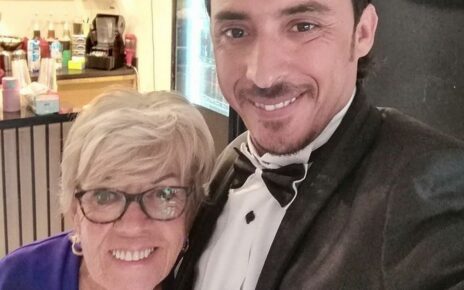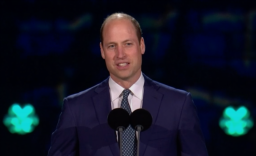EXCLUSIVE: Mother whose non-verbal daughter, 11, needs 24/7 care due to a rare genetic disorder hits back at cruel stranger who said she is ‘of no use to society’ because she ‘can’t work’ – insisting she ‘shines in other ways’
- Dr Alison Pearson’s daughter Isabel has a condition called Edward’s Syndrome
- An anonymous critic online said her daughter ‘was of no use to society’
- The mother says her little girl ‘shines in ways others can’t’ as she hit back
A mother has hit back at a stranger told her that her disabled daughter would be of ‘not use to society’ because she will ‘never be able to work’, saying she ‘shines in ways that others can’t.’
Dr Alison Pearson, of Bristol, is mother to 11-year-old Isabel, who has an extremely rare condition called Edwards Syndrome.
Edwards Syndrome, also known as trisomy 18, is a genetic condition with varying symptoms and degrees of severity, but in Isabel’s case means she is non-verbal, has developmental delays and needs round-the-clock care.
She is also physically small for her age and has already contracted serious illnesses due to being immunocompromised.

Dr Alison Pearson with her daughter Isabel who has Trisomy 18 or Edward’s Syndrome – she is now 11-years-old, despite the condition having a low survival rate

Isabel’s smile can ‘light up a room’ her mother says after a critic online said her daughter would be of ‘no use to society because she can not work’
https://youtube.com/watch?v=sz0YZMe9Mdg%3Frel%3D0%26showinfo%3D1%26hl%3Den-US

Dr Pearson revealed she received a cruel comment from an online troll who told her that her daughter’s life is ‘of no value because she will never work?
Yet Dr Pearson, a postdoctoral research fellow of education, wellbeing and resiliencies, wants to focus on all that Isabel has achieved – against the odds.
Only about 13 in every 100 babies born alive with Edwards’ syndrome will live past their first birthday.
‘It would be easy to focus on what she can’t do, and that’s often what people want to know,’ Dr Pearson said in an interview with FEMAIL.
‘Isabel has significant delays in her development, so in many ways it is like having a much younger child. She needs someone with her at all times, and needs to be helped with eating and personal care.
‘She has no awareness of danger, and can’t talk – that said she does make her feelings and wants pretty clear to everyone who knows her.
‘When our little girl was born she was diagnosed with full Trisomy 18, there was so much worry, but also love as well.
‘We wondered whether there would even be a tomorrow – or what kind of life she would have, but every day she shows us how beautiful she is.’

Isabel plays in the sand on a trip to the beach with her family, showcasing her infectious smile. Only about 13 in every 100 babies born alive with Edwards’ syndrome will live past their first birthday

Isabel at home with her mother, who says she has a ‘wise’ soul and a ‘light that shines wherever she goes’
Dr Pearson continued: ‘There are things she can’t do yes, but more importantly – there are so many things that my daughter can do and that’s what people need to know.
‘Disability doesn’t just mean someone is written off, it means they are just different, think differently and sometimes they can teach us things – which is a great gift.’
What is Trisomy 18 or Edwards Syndrome?
Trisomy 18 is one type of trisomy and is often called Edward’s Syndrome.
According to the NHS ‘A baby with Edwards’ syndrome has 3 copies of chromosome number 18 instead of 2. This affects the way the baby grows and develops.
‘Having 3 copies of chromosome 18 usually happens by chance, because of a change in the sperm or egg before a baby is conceived.’
Each cell in the human body usually contains 23 pairs of chromosomes, which carry the genes you inherit from your parents.
Your chance of having a baby with Edwards’ syndrome increases as you get older, but anyone can have a baby with Edwards’ syndrome.
The condition does not usually hereditary or caused by something that has happened during the mother’s pregnancy.
Full Edward’s Syndrome is different from Trisomy 12 or Trisomy 15.
The effects of full Edward’s syndrome are often more severe. Sadly, most babies with this form will die before they are born.
All babies born with Edwards’ syndrome will have some level of learning disability.
Edwards’ syndrome is associated with certain physical features and health problems.
Every baby is unique and will have different health problems and needs.
They will usually have a low birthweight and may also have a wide range of physical symptoms including growth issues and problems feeding.
They may also have heart, respiratory, kidney or gastrointestinal conditions.
One sweet clip shows Isabel playing with her older brother, having fun in the swimming pool and enjoying an ice cream, all things her parents were worried she might never be able to do.
The coronavirus pandemic was a worrying time for the Pearson family, as one of Isabel’s peers died of Covid-19.
‘We are acutely aware of how precious life is, not least because we have had a number of scary hospital admissions over the years,’ Dr Pearson continued.
‘Obviously this has made the pandemic a pretty concerning time for us too. One of Isabel’s peers, who was ten years old at the time, died of the coronavirus at the end of last year and that sent a massive shock wave round our little community.’
Throughout the pandemic the Pearson family have been trying to raise awareness about Isabel’s condition – in particular about mask wearing in public and how schooling through Zoom just wasn’t effective for someone like Isabel who needed a more interactive type of teaching.
Dr Pearson said: ‘We just wanted people to understand that their lives might have returned to normal, but that the challenges of looking after a disabled and vulnerable child had just got greater.
‘We asked people to think about small things they could do like wearing a mask in the shops or staying home if they have a positive test as that’s no longer a requirement.
‘Many people have been sympathetic to this, but there have been some who have been downright nasty and rude.’
Someone sent a cruel message to the mother saying that her daughter has no value ‘because she will never work’.
Dr Pearson continued: ‘That’s when this anonymous person – with no profile picture or personal details said that my daughter would ‘be of no value’ to society anyway. That really stuck with me.
‘I wanted people to recognize that there are some things that people like Isabel have and do that are better than, not less than. Not feel pity but compassion.’
Dr Pearson was taking photos of her daughter at a later date, whilst sitting on a bench and she said Isabel just looked ‘so happy’ – it was then she decided to post something back on Twitter about the anonymous poster, bringing the issue into the light.
She said: ‘When I woke up the next morning I could not believe how many people had liked or shared my tweet, and the lovely comments that were on there, and over the next few days this continued to grow – I just couldn’t keep up with the comments.
‘It did give me a bit of hope that maybe when some of the people who saw our post are thinking about disability that they will remember us and think just a little differently. At the very least all those people got to share the joyful smile of our beautiful daughter as she continues to leave her mark on this world.’

Trisomy 18 or Edward’s Syndrome is rare and less than 13 in 100 babies diagnosed with the disability make it to adulthood – but Isabel is breaking those barriers every day. Pictured, in an adorable photo

When Isabel was born her parents were worried if she would eat, walk or talk but she has reached the age of 11 and has done so many things her family initially didn’t think were possible
Twitter users responded in their droves with one saying: ‘The vileness of capitalism, when all you are measured by is how much you can be exploited for profit at the lowest possible pay.
‘Why anyone thinks they have the right to say what they did about your much beloved daughter who has additional needs, all children are special just different.’
Another responded: ‘Have we have slept walked into a neoliberal dystopia? believing that peoples worth is gaged by their financial productivity, however ‘the true measure of any society can be found in how it treats its most vulnerable members’. You have a beautiful daughter, her value immeasurable.’





People were horrified that someone could make such a comment and took to Twitter to say how beautiful Isabel is and share their own stories of ableism
A mother who’s child also has a form of Edward’s syndrome revealed on the thread that she too had heard similar comments about her young daughter.
She said: ‘I’ve heard a few similar comments about my daughter with Trisomy 13, who will be turning 3 soon and is pure joy! Imagine having such hate in your heart not to see her value and worth.’
Another parent spoke up about their 18-year-old daughter Amelia, who can’t walk or talk.
They said: ‘This is my 18 year old daughter Amelia. She can’t walk or talk and so will probably struggle to get a high paying job. Her ‘value’ is the joy she brings to the lives of those around her.
‘The ‘profit’ is how our view of the world has changed because of her. She is priceless’.

Dr Alison Pearson responds to the huge waves of support online after an unnamed critic questioned her daughter’s ‘value’ she said the support has ‘restored her faith in humanity’
Dr Pearson said the positive response ‘restored her faith in humanity’.
She said: ‘Isabel shines in ways others can’t, and I just don’t understand why someone would make a comment like that.
‘Yes she is disabled and I’m not going to say it isn’t without challenges, but she is shining light and her smile can brighten up a whole room.
‘Isabel reaches out to you for a hug – which is pretty hard to resist and makes you feel like the most loved person in the world.
‘Isabel has wisdom in her eyes, like she can see right through into your soul, and many people who are close to her feel that.
‘She is a bright, happy girl and brings such joy to our lives – someone’s worth isn’t measured on how much they can work and this kind of view is abelist.
‘I can’t believe how many people came forward to defend my daughter, it has restored my faith in humanity.’
Source: Read Full Article

